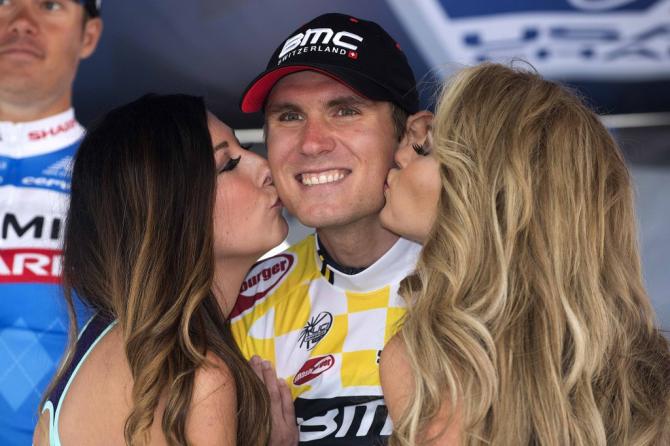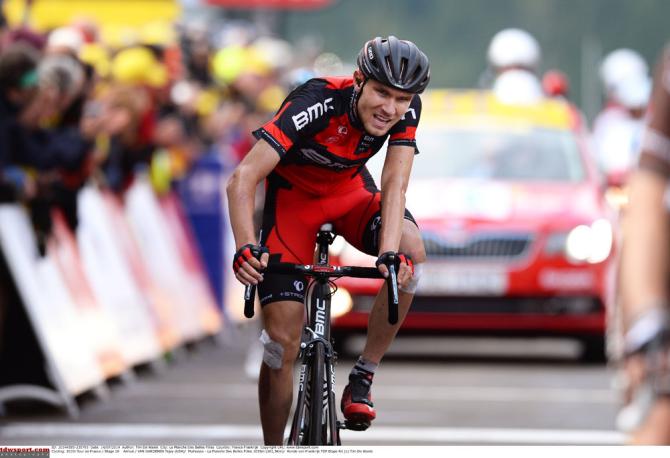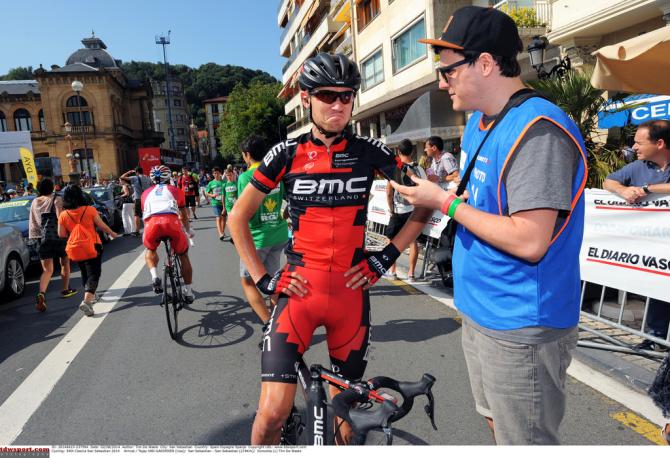Van Garderen Q&A: I can be up there with Froome and Quintana
American talks pressure, fractured hips and his quest to win the Tour de France



When Tejay van Garderen (BMC Racing) moved up to fifth overall in this year’s Tour de France the broadest smile he’d displayed in weeks spread across his face. It came from a combination of joy and sheer relief, as if the release of all that palpable tension and pressure had been lifted with one ride. After a difficult run in 2013, the American had delivered the best possible answer to his critics.
It’s now September, with van Garderen about to embark on the final two goals of his season at the Worlds and then the Tour of Beijing next month, however, as he tells Cyclingnews in this exclusive interview he already has one eye on next season, and yes, he believes he can one day win the race. The American talks pressure, media training, race strategy, and about the moment he broke the news of his fractured hip to his teammates.
Cyclingnews: You’re nearly at the end of you season with Worlds and Beijing still to come. How would you assess your year so far?
Tejay van Garderen: I think this has been a successful year. I’m not going to say that every race I did was a hit because there have been a few bad moments, but if I take the year as a whole, there are a number of positives. I took my first WorldTour win at Catalunya, a top 10 in Pais Vasco and Oman was strong, so things rolled out well at the beginning of the season. There were a few hiccups with sickness at Paris-Nice and then crashing at Romandie, which led to a bad Dauphine, but then at the Tour things fell into place and then at the Pro Challenge I felt really good.
Cyclingnews: You won that race but was your form better there or at the Tour de France, in which you finished fifth?
Van Garderen: It’s hard to say. The competition at the US Pro, no offense, isn’t at the same standard as it is at the Tour. It’s at altitude, which also benefits me so it’s hard to compare but I felt like I had more spring in my riding in Colorado. At the Tour, I felt strong but I couldn’t really get out of the saddle at a few key moments.
Cyclingnews: Is some of that down to pressure? You’re under pressure every year as a big name American leading an American team but at the Tour you’re under this intense microscope. In Colorado you’re a favourite but the pressure lifts somewhat.
Get The Leadout Newsletter
The latest race content, interviews, features, reviews and expert buying guides, direct to your inbox!
Van Garderen: If you want to talk about pressure then we have to go back to 2012 and I was fifth at the Tour. Some people wrote that off as a flash in the pan. Then when I had a bad Tour in 2013 people were saying ‘I told you so’ and maybe they didn’t see me as a legitimate Tour de France rider, so yes there’s been pressure because the whole team this year were basing everything around me for the Tour. And last year I could fall back on some excuses and say, ‘well Cadel was the man’ but this year I didn’t have that so there was certainly some pressure there.
Cyclingnews: How did the pressure change when you told your teammates at the Dauphine that you’d suffered a fractured hip from a crash in Romandie. Because they’d been riding for you and you’d lost time in the mountains. It didn’t look like things were going to script ahead of the Tour. Can you describe the moment you told your teammates?
Van Garderen: I was actually really surprised with the reaction. Everyone on the team looked at me and said that the result at the Dauphine wouldn’t change anything and that they were still behind me 100 per cent. They told me to keep working at it and honestly that was just what I needed in terms of building my confidence. Telling them about the fracture actually took some of that pressure off my shoulders and meant I could race the Dauphine in a more relaxed manner. It made me remember that a result in June wasn’t the barometer for success, but the one in July was. Yet, I was hesitant to tell people at first because I was honestly worried they might lose some faith, and I was stressed, because I felt good in training but when it came to the Dauphine I was struggling. I needed to tell them why I was suffering but, from there, I went away and worked harder than I’d ever worked before. I know you get riders praising teammates a lot but genuinely I was overwhelmed with how much support the riders and the rest of the team gave me.
Cyclingnews: How does your result at the Tour this year differ from your 2012 result?
Van Garderen: To me, this year was a lot more special. Don’t get me wrong, 2012 felt great but no one expected it.
Cyclingnews: Did you expect to finish fifth in 2012?
Van Garderen: No. We had the defending champion that year and I was there to help Cadel win and I thought that if I rode well in the time trials and could stay with him in the mountains, I could push top 15 or top 10, but top five never entered my mind. The white jersey, I definitely wasn’t expecting that but next thing I knew I was in Paris. Everything went great and people were patting me on the back but then the race comes around again and in your mind you do question yourself a bit. It’s more about living up to things and dealing with the expectations. So that’s why, to have the ride I did this year, and to do it with the backing of the team, it’s a bigger accomplishment.
Cyclingnews: You seemed to get stronger as this year’s Tour went on but you also had some contrasting stages in the race where you suffered. What did you put that down to?
Van Garderen: Well, I crashed on stage 7 and I lost some time on the cobbles but that day over the Port de Balès I had this hunger knock, and I bonked. I was already on antibiotics because I’d picked up bronchitis on the first rest day but I just didn’t eat enough that day. And I don’t think I was perhaps getting stronger as the race went on. You see the Tour is a war of attrition so you have to look at it like this: take that first mountain day and you had Porte, Costa, and Van Den Broeck, all up there. And they’re all quality guys but a few days later those guys started to drop off and I was still there. Then we had Col de Ballet and I think some people thought that I was going to be the next guy to drop. And deep down, I was a little worried too. I didn’t know if I could bounce back, but I just kept focus, moved on from the bad day and put everything into the final two summit finishes.
Cyclingnews: What was the reception to your Tour result back home in the US?
You know what I think I need is a bit more training or something. I had five crashes, illness and then there was some pressure so after every day I was down and so tired and then reporters would come up to talk to me and I’d be saying ‘oh man this is so hard’. I would sound a little whiny. So back home people would ask me ‘do you actually enjoy racing the Tour?’ Was I sounding that bad? Because that was the biggest reception I got, not ‘good job on your ride’. Maybe I need to work on that a little bit.
Cyclingnews: Let’s look forward: Have you pinned down a schedule yet for 2015?
Van Garderen: I still have some way to go this year, so that’s taking up most of my thoughts but once again the Tour will be the objective. There are the WorldTour points and that’s a factor in what my schedule might look like but we’re balancing things out. The one area to decide on is perhaps the Tour of California because it was in and then it was out. It’s a race I’d like to go to, but it would take some delicate planning because of the Tour.
Cyclingnews: Is the Giro a possibility?
Van Garderen: Well actually I have this long term goal in my career and it’s to finish all three Grand Tours and all five Monuments, so before I’m done I’ll have completed the Giro, but in this day and age I don’t think it’s possible to do the Giro and then recover in time for the Tour.
Cyclingnews: Looking at the Tour what do you need to do in order to reach the level of Nibali, Contador and Froome?
Van Garderen: I wish I had an easy answer. I think it’s going to take for a lot of things to fall into place, not just at the Tour but from December 1st right up until Paris. We had this plan from the start of the year but things change and racing isn’t always an exact science, so when I got sick, the plan had to be modified. What ended up happening was that I had peak form for Paris Nice but then got sick and I had to recover, then train for further races and that took out an important rest period, so I had to change the plan for the Ardennes because I was feeling a little bit tired. The flow changed but I know that every rider has that at times, just look at Froome and Contador and what they had to fight through this year. I guess what I need is that clear flow but just perhaps more experience with dealing with the situations you don’t ever plan for. And that’s an evolution I go through and so do the team. We do it together.
Cyclingnews: But how far are you off your top potential?
Van Garderen: I don’t know. I would hope to be fighting with Quintana and Froome but maybe I’m not that sort of rider in terms of how I race the climbs sometimes.
Cyclingnews: Can you beat them?
Van Garderen: I think I can. If everything goes right then I can but to ask what it’s going to take, I don’t have the exact answer. We all watch each other and we all study the recon, we all take care of our diets and we all train, we tick all the boxes but Contador, Froome, those guys are pretty good, so maybe it’s just patience that’s the key. I’ll keep trying though and I have plenty of time.
Cyclingnews: A lot has been made of the structural management changes at BMC over the last 18 months. How much has that been a factor in the team’s progression?
Van Garderen: There have been a lot of changes and while change is never super smooth, there’s definitely been more motivation. It’s about, perhaps, having clearer goals so if you show up for a race - and your calendar has these different colours - then maybe blue means preparation or support or yellow means it’s a race you want to go for. And that’s worked out on a lot of different occasions. Take Amstel, for example, where we had guys in the moves and then Gilbert capped it off with the win. Before our style was to all ride on the front for our leader and if he could pull it off then great but if he can’t then it looks like we’ve failed. So now we have a more aggressive style in races, whereas if you want clarity you just stick us all on the front until there’s one of us left. Before eight guys would show up for a race and it was all marked yellow but you need support in races. Things are working out and we’re still channeling and growing and that takes a little bit of time.
Daniel Benson was the Editor in Chief at Cyclingnews.com between 2008 and 2022. Based in the UK, he joined the Cyclingnews team in 2008 as the site's first UK-based Managing Editor. In that time, he reported on over a dozen editions of the Tour de France, several World Championships, the Tour Down Under, Spring Classics, and the London 2012 Olympic Games. With the help of the excellent editorial team, he ran the coverage on Cyclingnews and has interviewed leading figures in the sport including UCI Presidents and Tour de France winners.
